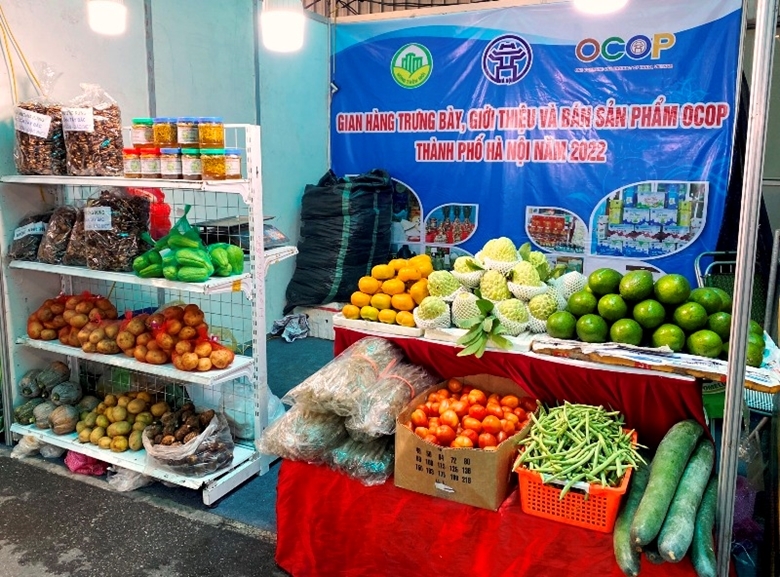 |
| A stall displaying OCOP of Hanoi. (Photo: CPV) |
Hanoi has a population of over 10.7 million people living, studying and working, so the demand for safe food and agricultural products is very huge, in which fruit is one of the most essential products.
Through a recent survey, Hanoi needs about 52,000 tons of fruit a month, of which the local supply meets about 35% of the demand. The distribution system of fruit products in the city is diversified with 29 trade centers, 112 general supermarkets, and 453 markets with about 4,050 fruit businesses, 1,872 fruit shops.
Acting Director of the Hanoi Department of Industry and Trade Tran Thi Phuong Lan said that with the goal of managing and developing the operation of fruit shops in the area in the direction of civilization, modernity, and ensuring food safety, Hanoi has carried out a pilot project on managing fruit shops in the inner city districts in 2017-2019, and a project strengthening the management of fruit shops in Hanoi in 2022-2025.
According to the pilot project, the Hanoi Department of Industry and Trade has so far coordinated with relevant units to grant identification plates to 100% of fruit shops in 12 inner city districts.
Besides, aiming to stabilize the market, promote the exploitation of fruit and agricultural products with quality assurance and clear origin for consumption at the local distribution system, Hanoi has deployed many activities to link regions, promote, and connect supply and demand of goods with provinces and cities.
In the 9 months of 2022, the city has organized, participated and supported businesses to participate in more than 100 events, trade activities, trade promotion in Hanoi and other provinces, distribution channels in the city to connect with provinces and cities to consume over 250,000 tons of goods.
In the coming time, aiming to continue promoting the connection of safe agricultural product consumption in Hanoi, Ms. Tran Thi Phuong Lan said that departments, branches and associations need to boost information popularization, promote production areas, safe products, and products with local strengths; and raise awareness of businesses and production households about provisions of the law in order to sign contracts for sustainable product consumption.
At the same time, functional agencies have strengthened inspection of the observance of the law on food safety by production and business establishments, and strictly handled violations to ensure the interests of genuine producers and consumers./.